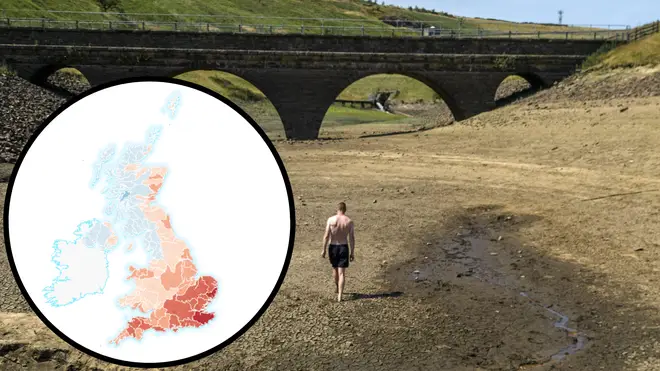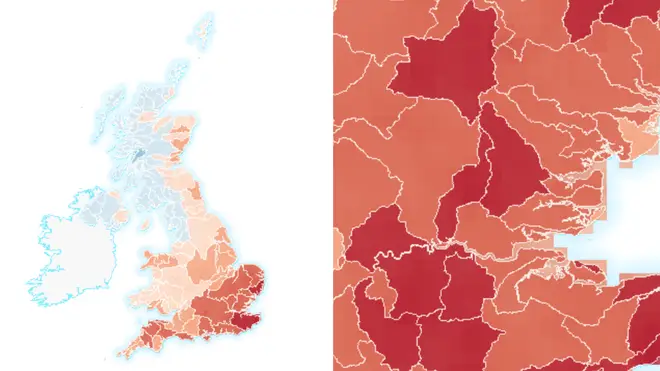
Tonight with Andrew Marr 6pm - 7pm
4 August 2022, 19:50

A new map has revealed every area in the UK at risk from a hosepipe ban as forecasters warn the UK is set for more hot and dry weather.
The Centre for Ecology and Hydrology has developed a new tool which shows just how water deprived each area in the UK is and highlights where could face hosepipe bans in the next few weeks.
An eight stage scale has been developed, depicting areas from 'Extremely dry' to 'Extremely wet' and alarmingly most of the Southern regions are marked as 'Extremely' or 'Severely' dry.
Whilst Central England, North Wales, East Scotland and parts of the North East are classified as 'Moderately dry'.
Forecasters have warned that there is "very little meaningful rain" on the horizon for parched areas of England as temperatures are set to climb into the 30s next week.
The Met Office said parts of England could see temperatures rise to the low or mid-30s by the end of next week due to an area of high pressure building from the Atlantic into the South and South West.
Read more: Millions of Brits could face £1,000 fines as water companies impose hosepipe ban

But the forecaster said while it could mean another heatwave, temperatures were likely to be well below the records set last month when thermometers climbed above 40C in some places.
The ongoing dry weather comes after months of little rainfall which, along with the heat, have left rivers at exceptionally low levels, depleted reservoirs and dried out soils, putting pressure on the environment, farming and water supplies, and fuelling wildfires.
It has prompted calls for action to reduce water consumption to protect the environment and supplies, and to restore the country's lost wetlands "on an enormous scale" to tackle a future of more dry summers and droughts.
And it has emerged that Thames Water's desalination plant, at Beckton, east London, which was built to deliver up to 100 million litres of water a day in dry weather events, is currently out of service.
Met Office chief forecaster Steve Willington said: "Many areas of the UK, especially the south, will witness temperatures several degrees higher than average, but these values are likely to be well below the record-breaking temperatures we saw in mid-July.
"As the high pressure builds there is very little meaningful rain in the forecast, especially in those areas in the south of England, which experienced very dry conditions last month."
Read more: Fresh hosepipe ban for Kent and Sussex after 'extreme weather conditions' triggers record dry spell
Here is Friday's #4cast as we head towards the tail end of the week pic.twitter.com/WtMaNWZ3WL
— Met Office (@metoffice) August 4, 2022
He added that weather fronts could bring some rain to north-western parts of the UK.
Rebekah Sherwin, deputy chief meteorologist at the Met Office, said the heat was due to temperatures building within a lingering area of high pressure - unlike the record-breaking heatwave last month when hot air drawn up from Europe added to already hot conditions in the UK.
Early August sunshine does not have the heating potential of the July sun, she added.
"Both of these factors suggest that we're very unlikely to see temperatures peak much above low to mid-30s. However, this would still be a hot spell of weather," she said.
There are indications of a return to more changeable conditions from about mid-August, the Met Office said.
Parts of England have seen the driest July in records dating back to 1836, following the driest eight-month period from November 2021 for the country since 1976.
In the face of the prolonged dry conditions two water companies, South East Water and Southern Water, have announced hosepipe bans, which will come into force in the coming days.
Other firms have so far held off bringing in restrictions despite low water levels, though some say they may need to implement bans if the dry weather continues.
Householders who have not yet been hit by restrictions are being urged to avoid using hosepipes for watering the garden or cleaning the car.
But water companies have been criticised by nature campaigners for leaving it to "the last possible moment" to bring in restrictions, when rivers are in a "desperate" state, and for last-minute announcements that spur an increase in water demand before hosepipe bans come in.
Mark Lloyd, chief executive of The Rivers Trust, said: "Every year we get to this perilous position and at the last possible moment, when the rivers are at their lowest, we get discussion of temporary use bans.
"Announcing it at the last minute causes people to rush to wash their cars and fill their paddling pools, wash the dog, and causes an increase in demand before the ban comes in.
"This should happen before the rivers come to a desperate condition and there's not enough water for wildlife."
Read more: First hosepipe ban imposed in England on residents in Hampshire and Isle of Wight

The 'utter incompetence' of water companies has led to hosepipe ban
The Rivers Trust is calling for accelerated metering, rapid reduction in leakage, support for households to reduce water usage, such as installing low flow toilets and water butts, and sustainable drainage including rain gardens, wetlands and permeable paving to build up local stores of water underground.
Ali Morse, water policy manager for The Wildlife Trusts, said there was a need to restore wetlands, 90% of which had been lost in the last 100 years due to development, drainage for agriculture and over-extraction by water companies.
She said: "As our climate changes, and we experience more dry spells and periods of drought, we must restore wetland habitats on an enormous scale.
"This will help retain water in the landscape when it's scarce, topping up river flows and providing a much-needed boost to wildlife.
"These same wetlands also hold water back during high flows, benefiting people by reducing risks of flooding downstream."
Ms Morse added that wild beavers "can help to do a lot of this work for us".
"They change habitats by damming streams, coppicing trees and, ultimately, creating the wetlands that we desperately need.
"It is crucial that Government clears the way for the return of wild beavers by giving farmers reassurances and incentives to allow these ecosystem engineers to get to work."
Beavers, once widespread in Britain, were hunted to extinction by the 16th century for their meat, fur and glands, but have been making a comeback and are now found living wild on a number of rivers as well as in enclosed sites.
Professor Alastair Driver, director of Rewilding Britain, said projects which restore natural hydrological processes, through measures ranging from blocking drains on the uplands to reintroducing beavers, can increase stream flows, make them more stable and keep water in the land.
Restoring wetlands and boggy areas can also reduce the risk of wildfires or act as a fire break, improve water quality and by creating shade over rivers through more trees, can lower water temperatures and evaporation.
"All of this points towards potentially significant benefits in extreme weather conditions, whether it be flood or drought," he said.